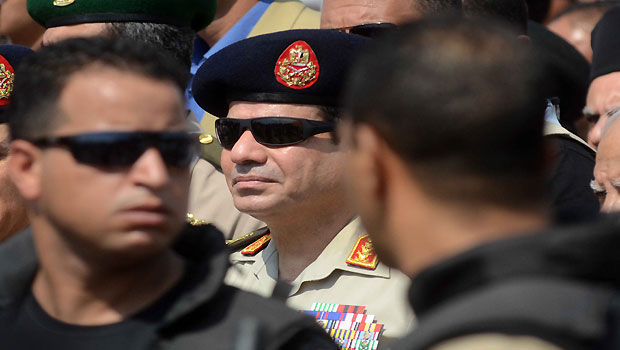The public mood in Egypt is one that is leaning towards presidential elections. This is evidenced by the fact that while the road map, which was set after June 30, includes the implementation of a series of important steps, including putting the new—or amended—constitution to referendum, as well as holding parliamentary and presidential elections, everybody is preoccupied with talking about just who Egypt’s next president will be. The new reality that has even obtained international recognition is that Defense Minister Field Marshal Abdel Fattah El-Sisi enjoys massive popularity in the Egyptian street as a result of the role he played following June 30. According to the information on the ground, nobody will be able to compete with Sisi if he decides to run for president.
In a recent interview with the British Daily Telegraph entitled ‘Egypt’s Eisenhower awaits his moment’, a reference to the US General and World War II hero who entered the White House, adviser to the Egyptian president Dr. Mustafa Hegazi said that Sisi has no plans to go into politics, but that he possesses all the leadership characteristics that the Egyptians want. Hegazi said that if the “right leadership” does not emerge by the time that the elections begin, then Sisi “might come forward.” He added, “General Sisi is an icon and if on the side of the people they want him in this iconic role, why not?”
On the other hand, some of the other potential candidates, including those who stood in the last presidential elections, have frankly stated that were Sisi to nominate himself, they would not stand. Meanwhile, Egypt’s newspapers are full of articles and reports that reflect the debate and discussions raging in the country.
It is noteworthy how this preoccupation with the presidential elections has dominated another equally important election—especially during the transitional period—namely, the parliamentary elections. This reflects the structure of the Egyptian society as well as the importance of the central role that will be played by the future president in formulating this historic period of rule.
No one can say for sure which way the wind is blowing. Everybody is full of anticipation and examining their steps. Besides, the official stance of the military institution still confirms that Sisi has emphasized, on several occasions, that he does not aspire to the presidency. This is something which has been expressed by Sisi himself in his speech following June 30 when he said that the task of protecting the will of the Egyptians is more honorable than seeking the presidency.
In the middle of all of this, no one can ignore the foreign factors that also place pressure on the situation in Egypt following June 30. No Egyptian side can ignore or disregard this factor given international balances of power and overlapping interests. Part of this reality calls for us to admit that the mood in Egypt is different from what is being promoted outside. Egyptians want a strong figure to assume the presidency and do not seem to mind if this figure is a member of the military.
This is something normal, given that the country is at a time of crisis and facing major challenges. Wary about the future, the Egyptians experienced the chaos of the first transitional period which the Muslim Brotherhood were largely responsible for, as well as Mohamed Mursi’s presidency, which was characterized by a lack of security, economic downturn, attempts at altering national identity, and national weakness, both domestically and internationally. There is a sense of nostalgia about having a strong country and a strong leader.
The reality is that the Egyptians are right. Egypt needs to emerge from the present road map with a strong president. In the end, this decision must be taken domestically and based on the will of the people, and the trust they will place on the figure they task with the presidency, regardless of what is said outside. This is their way and their own business, but it is also important to have a new road map along with the new president in order to advance society and begin to cure chronic problems facing the country. This road map should be based on a strong parliament that secures a larger social representation within the framework of a modern constitution as well as strengthening state institutions and the separation of powers. The Egyptians have no alternative but to move forward by way of developing the civilian aspect of the state that is based on modern principles and a productive economy. Responsibility for this falls on the political elite and the different political forces in the country.
